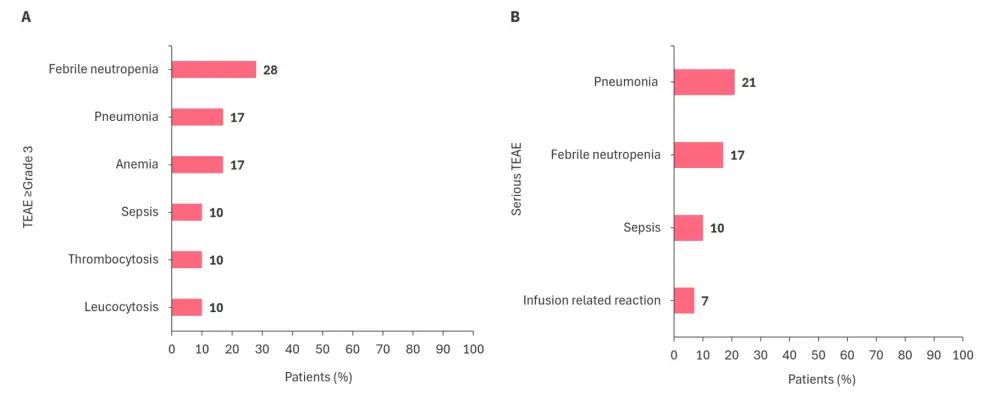All content on this site is intended for healthcare professionals only. By acknowledging this message and accessing the information on this website you are confirming that you are a Healthcare Professional. If you are a patient or carer, please visit Know AML.
The aml Hub website uses a third-party service provided by Google that dynamically translates web content. Translations are machine generated, so may not be an exact or complete translation, and the aml Hub cannot guarantee the accuracy of translated content. The aml and its employees will not be liable for any direct, indirect, or consequential damages (even if foreseeable) resulting from use of the Google Translate feature. For further support with Google Translate, visit Google Translate Help.
The AML Hub is an independent medical education platform, sponsored by Daiichi Sankyo, Johnson & Johnson, Syndax, Thermo Fisher Scientific, Kura Oncology, AbbVie, and has been supported through an educational grant from the Hippocrate Conference Institute, an association of the Servier Group.
Funders are allowed no direct influence on our content. The levels of sponsorship listed are reflective of the amount of funding given. View funders.
Now you can support HCPs in making informed decisions for their patients
Your contribution helps us continuously deliver expertly curated content to HCPs worldwide. You will also have the opportunity to make a content suggestion for consideration and receive updates on the impact contributions are making to our content.
Find out more
Create an account and access these new features:
Bookmark content to read later
Select your specific areas of interest
View AML content recommended for you
Safety and efficacy of pivekimab sunirine in R/R AML: phase I/II study
CD123 is commonly overexpressed in patients with acute myeloid leukemia (AML).1 Pivekimab sunirine is a novel antibody-drug conjugate comprising a high affinity CD123 antibody.1
Here, we summarize the results from a phase I/II dose escalation and dose expansion trial (NCT03386513) investigating the safety and antileukemic activity of pivekimab sunirine in relapsed/refractory AML published by Daver et al.1 in The Lancet Oncology.
Study design1
- The dose escalation phase followed a 3 + 3 dose design.
- In Schedule A, dosing started at 0.015 mg/kg of pivekimab sunirine and escalated five times to 0.45 mg/kg.
- In Schedule B, dosing started at 0.015 mg/kg of pivekimab sunirine and escalated twice to 0.060 mg/kg. However, Schedule B was not pursued further.
- In the dose expansion phase, two doses from Schedule A were selected (0.045 mg/kg and 0.090 mg/kg).
- The primary endpoints of the trial were the maximum tolerated dose and the recommended phase II dose (RP2D) of pivekimab sunirine.
- Secondary endpoints included safety and antileukemic activity.
Key findings1
- A total of 68 patients were enrolled in Schedule A at a median follow-up of 46.32 months.
- 38 patients in the dose-escalation phase.
- In the dose-expansion phase, 20 patients received 0.045 mg/kg and 10 patients received 0.090 mg/kg.
- The selected RP2D was 0.045 mg/kg once every 3 weeks; 29 patients received RP2D of pivekimab sunirine.
Safety
- During dosing Schedule A, there were three dose-limiting toxicities.
- The most common Grade ≥3 treatment-emergent adverse events were febrile neutropenia (35%), and pneumonia (28%).
- The most common Grade ≥3 treatment-related adverse event (TRAE) was febrile neutropenia (13%).
- The 30-day mortality rate was 7%.
- No dose-limiting toxicity-based maximum tolerated dose was reached.
- During the RP2D, treatment-emergent adverse events occurred in 97% of patients with the most common Grade ≥3 event being febrile neutropenia (Figure 1).
- The most common Grade ≥3 TRAEs were febrile neutropenia (10%), infusion-related reactions (7%), and anemia (7%).
- There were no deaths due to TRAEs.
Figure 1. A TEAEs Grade ≥3 and B serious TEAEs occurring in ≥5% of patients treated with the RP2D of pivekimab sunirine *

RP2D, recommended phase II dose; TEAE, treatment-emergent adverse event.
*Adapted from Daver, et al.1
Efficacy
- At RP2D, the overall response rate was 21% and the composite complete remission rate was 17% (Table 1).
Table 1. Efficacy endpoints of patients enrolled in dosing Schedule A and those treated with the RP2D of pivekimab sunirine *
|
Efficacy endpoint, % (unless otherwise stated) |
Schedule A |
RP2D |
|---|---|---|
|
ORR |
16 |
21 |
|
Complete remission |
3 |
3 |
|
Composite complete remission rate |
12 |
17 |
|
Median duration of ORR, months |
2.0 |
2.6 |
|
Median duration of composite complete remission, months |
2.2 |
2.3 |
|
Estimated median OS, months |
2.99 |
5.85 |
|
ORR, overall response rate; OS, overall survival; RP2D, recommended phase II dose. |
||
|
Key learnings |
|---|
|
References
Please indicate your level of agreement with the following statements:
The content was clear and easy to understand
The content addressed the learning objectives
The content was relevant to my practice
I will change my clinical practice as a result of this content


